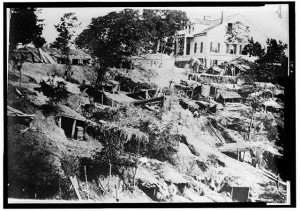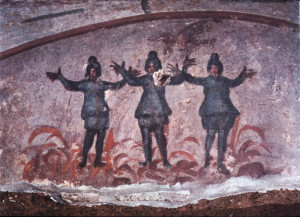The main thing I remember about The How and Why Wonder Book of The Civil War was an image of the caves in Vicksburg that residents lived in to avoid and/or survive the federal shelling of 1863 (I haven’t fact-checked this memory in decades). In this article the Times’ correspondent talks a lot about the Union bombardment but also points out that the Northern troops were having to come to grips again with the intense heat of a Southern summer.
From The New-York Times June 11, 1863:
DETAILS OF THE SIEGE.; The Weather Heat Sinking of the Cincinnati Busy Times at Vicksburgh Admiral Porter Farragut on hand A Fast Day in Vicksburgh.
IN REAR OF VICKSBURGH, Saturday, May 30.
The weather, which for the last month has been as cool as one could expect, has suddenly become as hot as the furnace prepared for the three uncompromising Hebrews. The air is tremulous with heat; the dust-covered leaves droop and wither; thunders go growling and roaring over the sky toward evening, but bring us no rain, only hot lightnings and hypocritical clouds; the nights are stale with polished skies and a bright moon that instead of light glow with and reflect back the heat which the earth has absorbed during the day. Where yesterday there was a green, placid bayou, there is to-day only a natural canal, on whose steep banks lie rotting dogs and unshapely driftwood, and whose bottom is covered here with oozy, bubbling slime, and there with yawning cracks that seem to open down to the centre of the earth.
Standing upon any one of the higher hills between Ha[y]nes’ Bluff and Vicksburgh, the entire position of our army, its movements and the passage of teams can be correctly guessed at by the spectator, by watching the lines of dust that rise above the ocean of verdure whose leafy swells and hollows stretch away illimitably before him.
The Southern Summer — that Summer with its sweltering heats, its dried-up streams, its nights dripping with unhealthy dews, its dust-malaria, discomforts and death — is upon us.
We are making some progress toward the capture of Vicksburgh, although, just now, operations are so multifarious and extended, that it puzzles one to keep track of them all … [you can keep track of the military maneuvers at Seven Score and Ten, including the sinking of the Union’s Cincinnati on May 27th which the Times’ corespondent mentions in this section]
The eight mortar-boats seem to be doing very efficient service. Within the last two days they have blown up choice magazines in town, and besides causing much other perceptible damage, have kept, the inhabitants in a constant state of alarm and wakefulness. Deserters, of whom there is a continuous stream, inform us that soldiers, citizens and everybody else, live night and day in ditches, outside of which there is not an instant’s security of life. Wednesday was determined upon as a fast-day, with the double purpose, probably, of propitiating Providence and economizing their limited rations. In the evening one of the Pastors, during a full in the firing, got a few of his flock together, and took possession of one of the churches, for the purpose of having a quiet season of prayer and penitence. Scarcely, however were they in full progress are a shell from one of the mortars crashed through the roof beneath which was gathered the secession supplicants, and blew one entire end of the building into a pile of brick, dust and shattered timbers. Of course this interruption put an end to the prayer meeting, and instanter the pious rebels betook themselves to the security of their ditches. To a superstitious mind, the advent of the shell at that particular moment and place might indicate that Providence was not listening with a willing ear to their petitions for the success of treason; but, whatever conclusions; they may derive from this incident, it is more than likely that hereafter their matutinal orisons, as well as their vesper supplications, will not be put forth in places liable to the visitation of our 200, pound shells.
Deserters also state that they have sufficient provisions to sustain life for three weeks by reducing the issue to half and quarter rations. They say that their force consists of from 15,000 to 20,000 men, but that the ceaseless cannonading kept up from our lines has worked them out by keeping them constantly on the alert, and preventing them from sleeping. They continue to hold out under the hope that they may yet receive assistance from beyond Big Black River.
Yesterday morning the mortars, gunboats and all the batteries on land opened simultaneously soon after daylight, and kept up the fire until each gun had expended fifteen rounds; the whole being devised to annoy the rebels, for which purpose the guns were all shotted, and to celebrate the anniversary of our march into Corinth. Undoubtedly, the rebels derived, far less gratification from the jubilation than we — particularly as their side of the celebration occurred before the muzzles of the guns, while ours took place at the breech — a trifling difference in position which, as I have frequently noticed, makes vast difference in a man’s feelings.
FAR[R]AGUT reached here yesterday with five additional gunboats …
Yesterday, a rebel dispatch bearer came to the headquarters of Gen. GRANT, and gave him a letter which had been intrusted to him by Gen. PEMBERTON, to deliver to Gen. JOHNSTON. The letter informed JOHNSTON that unless within ten days he attacked, GRANT with at least 30,000 men, Vicksburgh would, have to fall. It is thought by some that the whole operation is a ruse on the part of the Confederates but even supposing the letter to be of that character, I do not see what the rebels would gain by it.
Last evening, the anniversary of the taking for Corinth, was again observed along our entire line. [???] do not believe that heavier salutes ever shook the air, than on this occasion, It was an operation whose fullness, resonance and rapidity would have delighted the most fastidious of anniversary observers, and it was, probably, as satisfactory to us as it was annoying and ominous to the rebels. GALWAY.
In addition to the shelling, the Union siege is really putting the pressure on Confederate supplies in Vicksburg – like food. I like GALWAY’s “kill two birds with one stone” comment of the fast day reported by deserters – the “double purpose, probably, of propitiating Providence and economizing their limited rations”



![The siege of Vicksburg - Major General U.S. Grant, commanding (by Alfred Edward mathews, Cin[cinnati], O[hio] : Middleton, Strobridge & Co. Lith., c1863.; LOC: LC-DIG-pga-03977)](https://www.bluegrayreview.com/wp-content/uploads/2013/06/03977r-300x227.jpg)